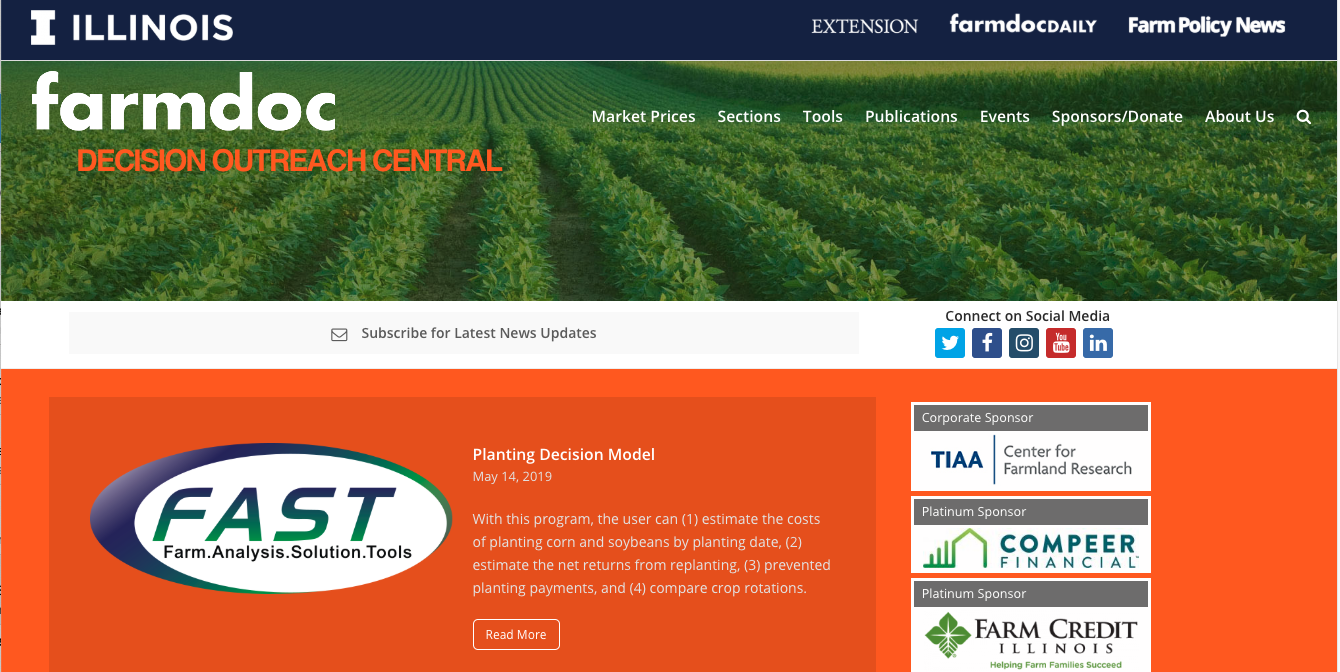farmdoc has provided agricultural producers with information and support for 20 years

URBANA, Ill. – Midwest farmers and agricultural professionals have a trusted resource in farmdoc, the University of Illinois project that provides research-based information and analysis on agricultural finance, marketing, and management.
farmdoc celebrates its 20th anniversary this year. “Our first website was originally launched as a comprehensive system to assist with decision-making for farms under risk. It covered marketing outlook, market advisory, and financial management,” says Scott Irwin, U of I agricultural economist and farmdoc team leader. Irwin is a frequent contributor to the site, along with other specialists from U of I and Purdue University.
“While the scope of farmdoc has expanded, the overall goal hasn’t changed. It is still to provide Corn Belt crop and livestock producers with constant access to integrated information and expertise to better manage their farm businesses,” Irwin says.
Lin Warfel, who grows corn and soybeans near Tolono, says farmdoc is a key resource in decision making for him. “Information often goes deeper than farm magazine articles. It’s trustworthy, and valuable for controversial issues. If you want the straight story, go to farmdoc,” he says.
“The contributors are seasoned experts and they are all very sharp, the kind of people you want to go to for good, quality information. They’re into numbers more than emotion. I really like to separate emotion from hard data, and farmdoc does that for me,” he adds.
Warfel has farmed for 57 years and has seen a lot of changes along the way. “Initially I farmed in both Champaign County and Douglas County. I knew both farm advisors in the two counties, and that’s where I would go for information,” he says. “Nowadays I go to the computer and to farmdoc instead of going to the farm advisor. In fact, farmdoc is my farm advisor.”
Karlie and Andrew Bowman, who grow premium, hull-less popcorn on their farm near Oneida, also look to the site for practical information. “farmdoc is one of the few examples where the theory of academia is distilled by academia into meaningful, real-world business decision-making. The articles are timely, informative and interesting for our family farm and agribusiness,” Andrew Bowman says.
Over the years the project has grown to incorporate other resources, such as farmdoc daily, which aims to publish a new research-based analysis article each business day, Irwin says. In 2016, the Farm Policy News site was added to provide updates on current developments relating to the farm economy and U.S. farm policy.
farmdoc daily is a favorite resource for Maria Cox, who farms with her parents, Ethan and Penny, on their family grain, hay and livestock operation in White Hall. Cox says she reads farmdoc daily every week. “I use the farmdoc publications as resources for making farm decisions such as grain marketing,” she adds.
The breadth and scope of farmdoc makes the site a key resource not just for producers but also for agricultural industry leaders. Tom Tracy, president and chief executive officer of Farm Credit Illinois, says he uses farmdoc almost daily.
“The information on crop insurance and crop budgets is critical to enhancing overall understanding of the risk in our industry,” Tracy says. “The daily email updates with articles are the best way to stay up-to-date with emerging issues such as ASF [African Swine Flu], MFP [Market Facilitation Program], crop forecasts, etc.”
To celebrate the 20th anniversary of farmdoc, the team is publishing a series of nine farmdoc daily articles that look back at major developments in the various subject matter areas covered by the project and offer some thoughts on where things might be headed in each area.
In addition, a one-hour webinar will be offered at noon on Tuesday, Sept. 10, entitled “Is farmdoc the Future of Agricultural Extension?” The webinar will tell the story of the development of farmdoc and then discuss whether farmdoc is the future of agricultural extension programs. This will be followed by Q&A with a panel of farmdoc faculty. Webinar attendees will be able to ask questions of the panel. The webinar is free but registration is required at the webinar website.
farmdoc is hosted by the Department of Agricultural and Consumer Economics in the College of Agricultural, Consumer and Environmental Sciences at the University of Illinois. There are multiple ways to connect with farmdoc, including email updates, Facebook, Twitter, LinkedIn, Instagram and YouTube.